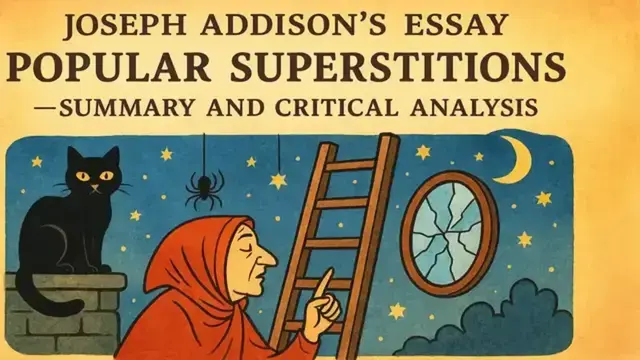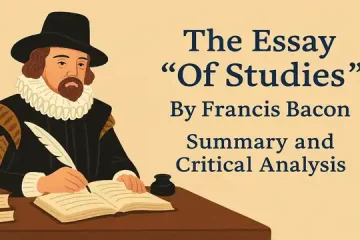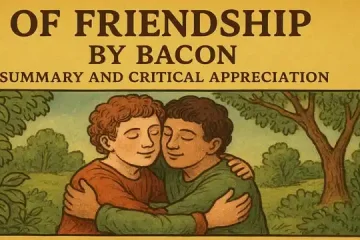Introduction of the Essay “Popular Superstitions“:
The immortal popularity of “The Spectator Papers” depends primarily on the fact that they are not confined to some particular aspect of social life but that they have covered the whole society in its varied fields. They perform two functions simultaneously. On the one hand, they present the faithful picture of the social life of the middle class with all their weaknesses and evils and on the other hand, the essayists have successfully imparted a number of moral lessons which can help people in making their life happier and easier. Throughout, sane advice has been scattered from place to place which confirms that their chief aim is social reform. They sometimes directly point out those evils and inspire a feeling that such follies must be abolished and sometimes, these ideals have been portrayed through the ideal characters like that of Sir Roger! In the present essay, Popular Superstitions, Addison has pointed out the folly of superstitious beliefs which poison our everyday life. They are such incidents which often take place and we foolishly consider them as bad omens, take unnecessary notice of them and sometimes spoil and whole pleasure of the company.

Summary of the Essay “Popular Superstitions”:
One day, an old friend of Addison invited him to dinner with his family. They were old friends. When Addison reached his home, he was surprised to find that the whole family was very much disappointed. The reason was that the lady of the house had seen a very bad dream last night and all of them were afraid of something wrong. They were afraid that such a dream was the foretelling to some great disaster to the family in near future. All these circumstances made Addison believe that the hostess in particular was a deeply superstitious lady. Whatever happened in the family was enough to confirm his belief that the superstitions had a powerful influence on the whole family. Addison stayed with the family for some time and all this time, he was utterly confused and restless. He agrees that this friend was a nice gentleman but he had a very poor understanding. He was not a wise man. He always agreed with whatever his wife said, no matter they were foolish beliefs. She had full faith that the dreams bring good or bad luck. There were many other superstitions also which they strongly believed. They never began any new work on Childermas day. The spilling of salt meant to them a bad omen and if it happened at dinner, the mood of the whole family was spoiled. The family became gloomy and sad if the knife and fork were left across each other upon the plate. Addison thought that taking dinner with such a family was most painful in itself. They thought that Addison was becoming the cause of their difficulties because he had spilt the salt and had laid the knife and fork across upon his plate. They also thought that he was the man who was seen in the dream last night. Addison considered them to be foolish beliefs so he hurriedly finished his dinner and left them and thus saved his host and himself from any embarrassment.
Addison tells a truth that as soon as a person becomes unnecessary and unwanted in a company, he immediately knows and realises it. In the same way, he had also noticed at once that he was unwanted in the family of his friend. The hostess thought him unwelcome and unfortunate for her family. Naturally, he did not stay there any more after the dinner was finished and departed without waiting. When he reached home, he was very thoughtful and thought over the incidents seriously, that had happened with him. He concluded that nothing but the foolish superstitious belief was the root cause of everything that had happened that evening. He concluded that the superstitions were responsible for the imaginary and unreal afflictions in the life of man. These foolish and absurd things bring misery. Those who believe in such incidents like the omens and superstitions are the greatest fools. Even if there is no misery or suffering in our life, the superstitions bring misfortunes. So, we suffer as much from unreal and imaginary miseries as from real accidents and tragedies. He recounts the shooting of a star or screaming of an owl at night as the greatest superstitions. They create unnecessary anxiety in our life. Such people make their life an ordeal of apprehension and misery because they perceive disaster in every occurrence.
In the opinion of Addison those old ladies who are physically ill and are unable to do any useful work in life find it difficult to pass their time. In order to keep themselves busy they employ their time in making prophecies about the impending disaster which is nothing but simply their foolish imagination. They spread such evil things and absurd beliefs among the simple-hearted people and thus all the time they suffer from an unknown fear of some disaster. In this way, they are the chief source of spreading the menace of superstition in the society. The simple and innocent people particularly suffer from such fear. In such a condition, it is the duty of the wise people to save them from such follies and remove their absurd fears. They should create sound reasoning in them and convince them about their evil. They should make them feel the folly of these superstitious beliefs.
In the last part of the essay, Addison talks about himself and says that in his personal life, he has no faith in any such superstitions nor does he believe in knowing his future. He reasons that this habit does not give any pleasure rather it causes more and more trouble and mental disturbance. In a humorous manner, he says that even if he had the power to know his future, he would not have done so. Instead of it, he would prefer only to remain concerned with what is actually happening with him. He further tells that it will be better to put himself under the care and protection of God instead of being afraid of the supernatural forebodings. God only will save him from all the evils and misfortunes of life in all the circumstances. In this way, Addison expresses his strong faith in God and rejects all the other foolish beliefs. This faith gives him a great relief from the miseries and misfortunes of life and at the same time saves him from imaginary, unreasonable and absurd fears which are the source of miseries.
Critical Analysis of the Essay “Popular Superstitions“:
Introduction:
With an intention of social reform, Addison has touched almost all the aspects of contemporary social life, whenever he realised the presence of any evil or social corruption. The present essay Popular Superstitions deals with the evil of popularly spread and observed superstitions in most of the families. He has not simply counted them but has highlighted their baneful influence on the social atmosphere and shows how they poison the life of man. It is quite full of great enthusiasm against such follies and expresses his earnestness to abolish them. He not only draws our attention to these absurdities that we take dreams to be the prophecies of impending evil or some common incident as a bad omen. The aim behind all this description is not to touch these evils but the intention is clearly reformative. This zeal of reform sometimes makes the essay like a moral teaching. But one thing is certain that the whole piece is a solid and wholesome lesson which will not only smoothen the life of man but make it sweet and congenial. This in itself is evidence of its significance and that the essayists are honestly performing all their promise they had made in the beginning of this periodical.
Story-Like Depiction:
The essay “Popular Superstitions” begins just as the essayist is going to tell us some interesting story. He tells that once a friend invited him to dinner where he had some embarrassing situations to face. The total behaviour of the incumbents of the members of the family has been perfectly and graphically revealed. He tells us like a story how he felt himself in a critical position in the midst of the people where everybody was superstitious and each trivial incident was taken to be a forecast for some impending misfortune. The mistress had dreamt last night about some mishappening and this had made them all very gloomy and disappointed. He also tells that in such an atmosphere there is a feeling of frustration instead of any cheerfulness or pleasure of the company.
Autobiographical:
Although Addison and Steele both are basically periodical essayists, but in order to avoid any controversy over any of their ideas, they have narrated everything in the manner of their own experience. Even while discussing the conduct and character of Sir Roger, they never become objective narrators but as if it is their personal experience. Here again Addison narrates the story of those unpleasant experiences which he had in the family of his old friend. The evil of superstitions though common in the society, had a peculiar effect on that family. The hostess felt that Addison resembled the man she had seen last night in her dream and so considers him unwelcome in the family. Addison also quickly realises this fact but he is helpless since he cannot leave the family without dinner. It is again purely autobiographical that he unknowingly spilt the salt during the dinner and everybody was shocked because, in their opinion, this act, chiefly during dinner, is the most damaging. It was again an unconscious act that he put the knife and fork across upon his plate which made the hostess so restless that they had to ask him to put them in the parallel position. All this shows that the essay is not narrative but the essayist reveals his difficulties in that home which certainly brings him close to the readers and enhances the interest of the place.
The Moral Tone:
The Spectator was designed to inculcate moral among the people. But this moral is not confined only to the religious sense. It includes all that is needed to make the life of man easy and happy. Here Addison expressly indicates that the superstitions are the greatest bane for man and they must be completely abolished from the society. He thinks that such evils and follies are invented by those spinsters who have nothing useful to do in their life and so their mind is always turned to inventing such peculiar ideas. The simple-minded ignorant people believe them quite easily and so unknowingly they invite difficulties. Sometimes such beliefs are so harmful that the whole of their life is destroyed. At the end of the essay, the tone of Addison becomes totally moralistic. He asks the wiser section of the society to make efforts to save the people from such things. They should come forward and convince the people that actually they are nothing but simply everyday incidents which have nothing to do with our future. Moreover, the last part of the essay is just a moral sermon when Addison advises that the best way to make life happy is to leave ourselves at the mercy of God and have full faith in Him. He says, “I know but one way of fortifying my soul against these gloomy passages and terrors of mind and that is by securing to myself the friendship and protection of that Being who disposes of events and govern futurity.” He thus advocates strong faith in God and that death is the inevitable end of life and that “neither the time nor the manner of the death I am to die” is known to anybody. He, therefore, advises that “He will not fail to comfort and support me under them.” Thus, Addison expresses his absolute faith and confidence in God. He also advises that it is not good for man to try to know his future because it will never help him in any way.
Humour and Satire:
The essay undoubtedly discusses a very important aspect of social life and the subject under discussion is very serious, Addison makes it enlivening with his sparkling sense of humour. Even in the midst of serious discussion, he never grows tiresome and maintains the interest of the readers throughout. His humour is realised in the very beginning when the hostess finds him resembling the man, she had seen in her dream last night. He ridicules her superstitious beliefs particularly that her husband also agrees with her whims. We enjoy the remark when Addison says, “I observed a settled melancholy in her countenance.” Seeing Addison, the lady said, “you may now see the stranger that in the candle last night.” We enjoy the discomfiture of the essayist and how he quickly finished his dinner and actually ran from there without waiting a moment. He was considered unwelcome for putting fork and knife across and the lady had to ask him to change their position. We laugh when Addison confesses. “What the absurdity was which I had committed, I did not know.” He felt himself “a person that had brought a disaster upon the family.” Equally humorous is the remark that the old idle ladies are responsible for all this folly. He humorously but satirically concludes, “An old maid that is troubled with the vapours produces infinite disturbances of this kind.” There is certainly bitterness in his opinion that such people spread the evil of superstitions among the simple and innocent people and make their life troublesome. He thus chooses the weapon of wit, wisdom, humour, satire and ridicule deliberately.
Language and Style:
Like other essays, here also the style of Addison is marked for directness and simplicity. He presents his views quite clearly and the language is so easy that even a layman easily grasps his point of view. However, the complication has been avoided and the ideas have been put quite convincingly. The whole description is marked by straight forwardness and common sense. He has employed logic to persuade the readers to drive his point home. It has a force of a sermon, sincerity of a crusader and interest of a story.



